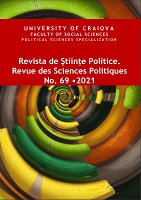The Romanian Kakistocracy: The Public Sector’s Ethos during the Post-communist Transition and its long-term impact
The Romanian Kakistocracy: The Public Sector’s Ethos during the Post-communist Transition and its long-term impact
Author(s): Andreea-Roxana GușăSubject(s): Government/Political systems, Corruption - Transparency - Anti-Corruption
Published by: Editura Universitaria Craiova
Keywords: kakistocracy; corruption; ethos; public sector; post-communism;
Summary/Abstract: The first post-communist decade was marked by the struggle to adapt to the new conditions of open society and free market. This translated into political instability, economic crises, poverty, inflation and unprofitable denationalisation of the industry and property. Adding to that, corruption became more pervasive, particularly among the political and bureaucratic elites, negatively affecting the quality of public services and general welfare. The very much expected Romanian democracy turned out, however, to be more like a kakistocracy. Kakistocracy refers to a society or government that is run by the worst possible people who are either unqualified or ill-intentioned and thus, incapable to serve the public interest. I aim to analyse the political and bureaucratic implications of the post-communist transition that hampered societal development, particularly the institutions' reluctance to adapt and understand their new role of efficiently and transparently serving the citizenry. In this regard, I will be focusing mainly on social culture and the ethos of the public sector, including the predilection that politicians and public servants show towards corruption. My thesis is that kakistocracy lies in patterns of social and organizational behaviour, as well as in old values that are no longer tolerable in a new socio-political layout. Therefore, I aim to emphasize concepts like amoral familism, power distance values, uncertainty avoidance and particularised trust.
Journal: Revista de Științe Politice. Revue des Sciences Politiques
- Issue Year: 2021
- Issue No: 69
- Page Range: 46-56
- Page Count: 11
- Language: English

